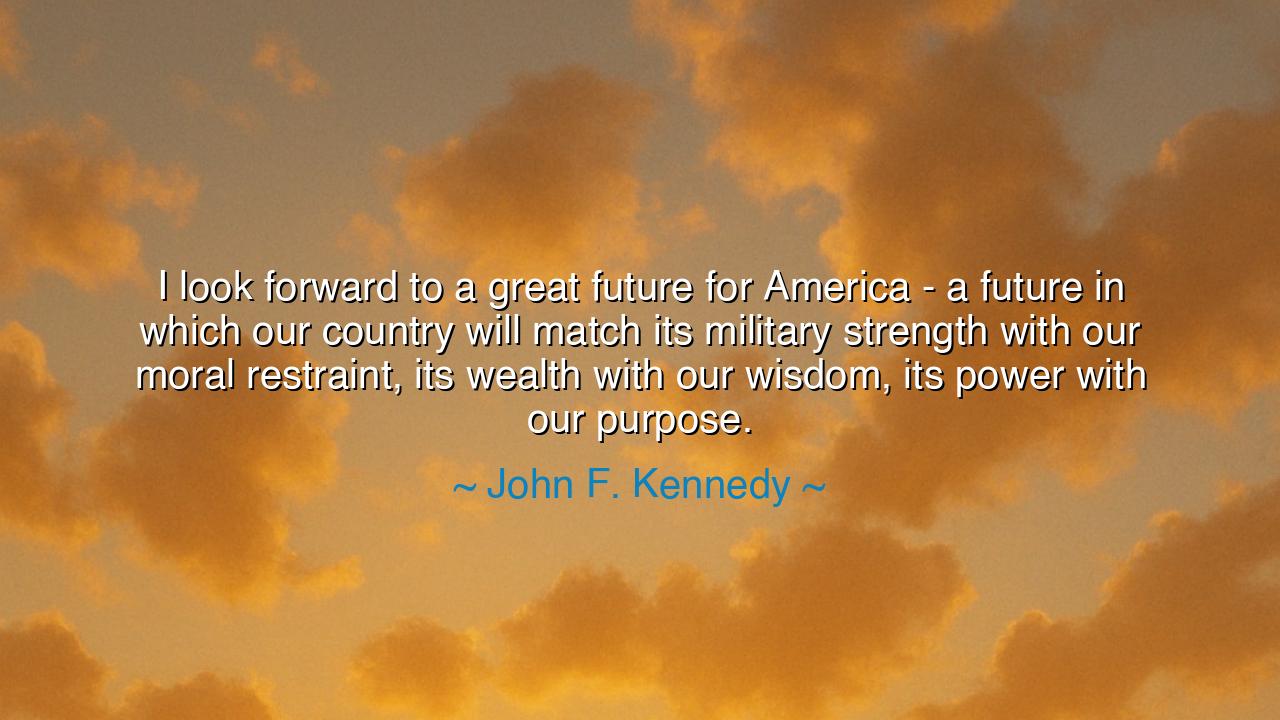
I look forward to a great future for America - a future in which
I look forward to a great future for America - a future in which our country will match its military strength with our moral restraint, its wealth with our wisdom, its power with our purpose.






In the long, storied history of humankind, there have been many nations that have risen to great heights of power and influence, but only those whose strength is tempered with wisdom and purpose have truly left a lasting legacy. John F. Kennedy, in his inspiring vision, said, "I look forward to a great future for America—a future in which our country will match its military strength with our moral restraint, its wealth with our wisdom, its power with our purpose." These words, spoken in the context of a post-war world in which America stood at the height of its influence, speak not only to the responsibilities of the United States but to the very nature of true greatness—one that requires not just dominance, but integrity.
In the ancient world, the greatest empires understood that strength and wisdom were not opposing forces, but complementary virtues. The Roman Empire, at its peak, was a symbol of military prowess and architectural genius, yet it was the moral and legal frameworks that the Romans built—justice, equality, and law—that gave their empire lasting power. Their ability to balance power with restraint created a society that flourished for centuries, allowing it to endure and expand far beyond the shores of Italy. Kennedy's vision was a call for the United States to follow a similar path, to not only wield its power effectively but also to ensure that it did so with a deep sense of responsibility and ethics.
This concept was echoed by Alexander the Great, whose military conquests spread Greek culture across much of the known world. But even in his conquests, Alexander understood that mere dominance was not enough. It was his introduction of Greek philosophy, arts, and governance that gave his empire a lasting purpose. His wisdom in merging the military and the cultural was a testament to the idea that true power is not just about victory in battle, but about creating a lasting legacy that nourishes both body and mind. Kennedy's words resonate with this same principle: military strength must be balanced by moral restraint, and wealth must be guided by wisdom.
Consider the story of Mahatma Gandhi, who, in the face of an empire that ruled with military force and wealth, chose a path of non-violence and moral restraint. Gandhi's methods were not those of conquest or destruction, but of purposeful resistance. By rejecting the use of force, he proved that true strength lies not in the domination of others, but in the ability to transform society through ethics and moral conviction. Just as Kennedy envisioned, Gandhi’s India became a nation where the power of its people was matched with a clear sense of purpose, a moral direction that transcended the immediate desires of domination.
In America's own history, there have been times when the nation's strength was tempered with moral vision. After the devastation of the Civil War, Abraham Lincoln guided the nation toward reconciliation and healing, understanding that true greatness was not in the strength of the Union, but in the wisdom to rebuild and reconcile a fractured society. Lincoln’s restraint and purpose laid the foundation for a nation that would eventually become a beacon of freedom and justice to the world. In this way, Kennedy’s call for a balance of strength with wisdom was not only an ideal but a vision rooted in the very principles upon which America was founded.
The true lesson in Kennedy's quote is this: power without purpose is fleeting, and wealth without wisdom is shallow. To be a great nation, or a great individual, one must cultivate a balance between action and reflection, between strength and ethics, between what is possible and what is right. Whether in America or in our own personal journeys, the key to greatness lies not in the desire to dominate but in the wisdom to act with integrity, to use power for the betterment of all, and to shape a future that is guided by purpose.
In our lives, we must ask ourselves: How can we balance our own strength with restraint? How can we use our gifts—whether in business, leadership, or personal relationships—to build a future that is not only successful but rooted in purpose and wisdom? Just as Kennedy called for the United States to reflect on its role in the world, we too must reflect on our own roles in shaping the future. Let us not only strive for personal power or material wealth, but for a future where our actions are guided by moral clarity, purpose, and the wisdom to create lasting, meaningful change for generations to come. The future is not simply a destination to be reached, but a journey that must be traveled with integrity and vision.






AAdministratorAdministrator
Welcome, honored guests. Please leave a comment, we will respond soon